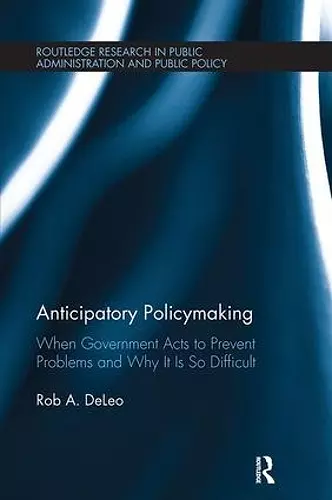Anticipatory Policymaking
When Government Acts to Prevent Problems and Why It Is So Difficult
Format:Paperback
Publisher:Taylor & Francis Ltd
Published:16th Jun '17
Currently unavailable, and unfortunately no date known when it will be back
This paperback is available in another edition too:
- Hardback£160.00(9781138813427)

Public policy analysts and political pundits alike tend to describe the policymaking process as a reactive sequence in which government develops solutions for clearly evident and identifiable problems. While this depiction holds true in many cases, it fails to account for instances in which public policy is enacted in anticipation of a potential future problem. Whereas traditional policy concerns manifest themselves through ongoing harms, "anticipatory problems" are projected to occur sometime in the future, and it is the prospect of their potentially catastrophic impact that generates intense speculation and concern in the present.
Anticipatory Policymaking: When Government Acts to Prevent Problems and Why It Is So Difficult provides an in depth examination of the complex process through which United States government institutions anticipate emerging threats. Using contemporary debates over the risks associated with nanotechnology, pandemic influenza, and global warming as case study material, Rob A. DeLeo highlights the distinctive features of proactive governance. By challenging the pervasive assumption of reactive policymaking, DeLeo provides a dynamic approach for conceptualizing the political dimensions of anticipatory policy change.
With this cutting-edge work, Rob Deleo makes a highly valuable contribution to both the theory and practice of public policy making. He begins with a (seemingly) straightforward question, one asked often by critics of government: Why can’t public officials anticipate social problems more effectively and take steps to avert or to lessen their impacts? Using concepts from the literature on agenda-setting as well as policy typologies and the implementation process, DeLeo addresses this question by means of a sophisticated analysis that is sensitive to the behavior of political and administrative institutions while also considering critical substantive differences across such issue areas as nanotechnology, public health pandemics, and climate change. The result is a wealth of insights into the distinctive dynamics of anticipation in the public arena, including suggestions for the right—and wrong—ways to improve performance in our age of "preparedness." —David A. Rochefort, Northeastern University
Most studies of policy change cite reactions to recent events as prime motivators for policy change. Rob DeLeo turns this process on its head, and considers how the policy process can address problems before they become damaging, attention-grabbing events. The book is firmly grounded in policy theory, and contains a number of examples effective anticipatory policy making that mitigated risks and prevented bad outcomes. DeLeo's painstaking and clear presentation shows that policymakers are not always reactive, that it has the capacity to anticipate and mitigate risks , and that this anticipatory policy making is characterized by patterns of behavior among actors and institutions that deserve our careful attention. This book is a fine example of contemporary policy research, and a useful corrective to the notion that the policy process simply waits for a disaster before rousing itself to action. The process is more complex and subtle, and DeLeo helps us see past this oversimplification.—Thomas A. Birkland, NC State University
ISBN: 9781138307476
Dimensions: unknown
Weight: 362g
246 pages